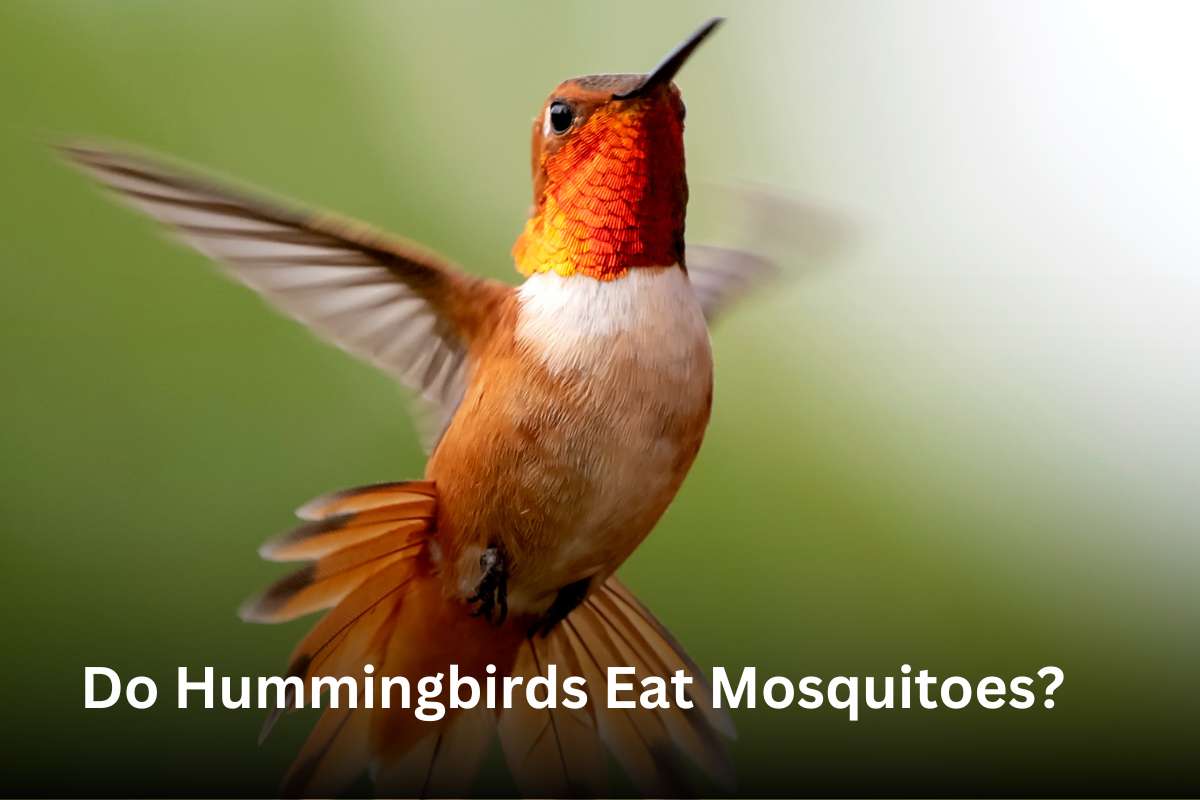Do Hummingbirds Eat Mosquitoes?

Hummingbirds are fascinating creatures commonly found in backyards, gardens, and parks. The small-sized bird is well known for its unique vibrant colors, incredible speed, ability to hover their flight, and feeding habits.
Primarily, most bird watchers believe that these tiny birds, Hummingbirds are known for feeding on sugary nectar from flowering plants.

These birds have a wide variety of diets. One of the questions that bird enthusiasts or bird watchers often raise is whether Hummingbirds eat mosquitoes or not.
Today, in this article we will explore Hummingbirds’ dietary needs and how to attract these beautiful birds to your yards for eating mosquitoes.
Understanding Hummingbird Diets
Hummingbirds have a diverse variety of diets. Primarily, their main source of energy is mostly comprised of nectar.
Nectar is a sweet liquid produced by flowers, rich in sugars that provide the necessary energy for these little birds. They have a high metabolic rate.
With the help of their long, probing bills, and tongues, these birds extract the nectar from the flowering plants. Their intestines are capable of extracting glucose from the nectar within minutes for over 99%.
Although nectar is a high-quality source of energy, it lacks the deficiency of many micronutrients and macronutrients. These tiny birds also intake sugar water from bird feeders.
This tends to have low lipids, amino acids, and other nutrients. The hummingbirds require a supplementary diet that consists of proteins, vitamins, and minerals. So, these birds intake the consumption of invertebrates.
Do Hummingbirds Eat Mosquitoes?
Yes, hummingbirds eat mosquitoes. Besides this, hummingbirds also eat small flying insects like ants, beetles, gnats, wasps, and gleaning spiders from their webs. These species of hummingbirds use their bill to feed on insects.
Insects like mosquitoes are one of the insects that are consumed by hummingbirds. But mostly these species of birds are nectarivores. Hummingbirds often exhibit as they are insectivores which refers to the consumption of any arthropod but not exclusively insects.
Generally, it has been observed that the hummingbird diet is 90% from nectar and 10% from arthropods by mass.
It has been revealed that hummingbirds intake insects like mosquitoes for a supplementary source of nutritional diet. While consuming insects it essentially includes proteins, vitamins, and minerals.
How To Attract Hummingbirds to Eat Mosquitoes?
Attracting hummingbirds to your yards can be effective in reducing the mosquito population. It is important to create a pleasant environment for these charismatic birds.
As we all know, hummingbirds do not consume nectar from flowering plants. It also includes a variety of small flying insects which provides them with a good source of protein and other essential nutrients.

Certain tips should be considered while attracting hummingbirds to your backyards for mosquito control. They are
Plant Nectar-Rich Flowers
Feeders shall mostly plant highly nectar-rich flowers. Hummingbirds are commonly attracted to bright colors such as red, pink, orange, and purple flowers.
The tubular shapes of flowers like trumpet vine and columbine flowers attract these birds. While planting these flowers it’s important to choose a variety of flowers that bloom throughout the season.
Offer Fresh and Clean Water
Another important tip that should be considered while attracting hummingbirds to eat mosquitoes in your yard is to provide clean and freshwater sources.
These birds are also attracted to the sound of running water. So, we can also add a small fountain or bird bath that helps to attract these birds.
Provide Sugar Water Feeders
Make sure that you clean the feeders to prevent mold and fermentation. While providing sugar water feeders to hummingbirds, it is essential to avoid using artificial sweeteners, honey, or food coloring essence.
The solution should be one-fourth of the white granulated sugar and three-fourths of the water. Place the feeders in a shaded area where these birds can easily locate it.
Create a Friendly Environment
Avoid using pesticides in your yards, to protect bird health and maintain an active bird population.
It does not harm the mosquitoes but also the beneficial insects that often visit your yard that the hummingbirds mostly rely on. It is necessary to opt for natural mosquito control measures.
This results in a safer alternative that effectively targets mosquitoes without endangering birds or other species.
Conclusion
In conclusion, it has resulted that hummingbirds consume mosquitoes, as it is not included in their primary diet. These remarkable birds meet their nutritional needs with a variety of small insects and nectar.
It is important to understand hummingbirds’ dietary needs and create an eco-friendly environment to reduce the mosquito populations. The tiny species of birds do not rely on eating mosquitoes.
Adopting a variety of tips and techniques to attract hummingbirds to your yards by planting nectar-rich flowers, providing clean and fresh water sources, and providing sugar-water feeders.
These efforts not only make your outdoor experience better but also help to keep species of birds like hummingbird populations healthy.
Frequently Asked Questions
Can hummingbirds help control mosquito populations?
Hummingbirds primarily feed on the nectar and occasionally include small flying insects like wasps, ants, mosquitoes, and spiders in their supplementary diet.
Which type of birds eat the most mosquitoes?
Birds like swallows, waterfowls, terns, ducks, and purple martins mostly eat mosquitoes.
What insects do hummingbirds eat?
Hummingbirds eat insects like aphids, gnats, weevils, ants, mosquitoes, beetles, spiders, fruit flies, and mites.
How many mosquitoes can a hummingbird eat in a single day?
Hummingbirds eat dozens of mosquitoes in a single day. It has been disclosed that they can eat between hundreds to thousands of mosquitoes in one day. However, the number of consuming mosquitoes may vary depending on the dietary needs of hummingbirds.






